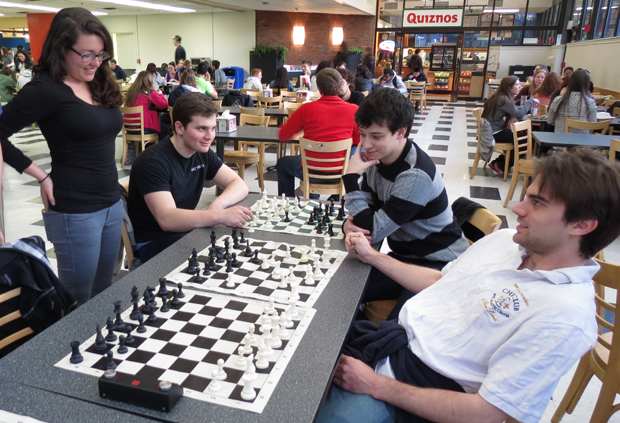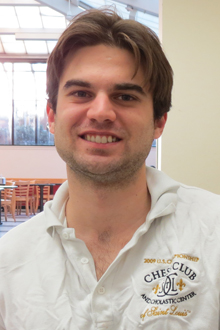Sam Shankland '14 advancing on international chess scene
Economics major ranks at the game's highest level of competition
 Photo/Se Jun Lee
Photo/Se Jun LeeChess club members, from left, Eve Litvak ’16, Yonatan Akivis ’16 and Michael Vilenchuk '16 with Sam Shankland ’14. The club meets at 6:30 p.m. Thursdays in Upper Usdan.

Sam Shankland '14
Samuel Shankland ’14 recently won the most prestigious chess fellowship in the United States – a $42,000 yearly award he can use to hire coaches and trainers and to buy study materials and other resources to improve his game.
"I don’t think I would need a trainer to mandate my schedule,” says Shankland. “I’ve been making my own decisions since I was 15 or 16 and I am very good at isolating the weak points of my game.”
What he will do with the 2013 Frank P. Samford, Jr. Chess Fellowship is hire experts to help him with those weak points.
“For example, if technical end-games are my problem, I would seek out a specialist at technical end-games,” says Shankland.
An Orinda, California, native, Shankland is an economics major and a chess Grandmaster, a title given only to the highest level of players internationally. His laid-back, confident posture is suggestive of the high level of self-assurance often found in leadership-role athletes like pitchers and quarterbacks.
“I’ve always been a very competitive person,” says Shankland. “When I was young, in elementary school, I was always one of the better athletes among the boys, but I was never the absolute best. When I found chess and found I was very good at it very quickly, it fed that need to win. So I kind of went along with it. It helps channel my competitive need.”
Many prodigies have reached the upper echelons of the chess rankings by age 12, while Shankland did not play his first tournament until he was 10. But once he started playing, his development was explosive. He became a National Master just four years later.
In the “About Me” section of his website, Shankland says he “ran into a brick wall” soon after that accomplishment.
“I think it was largely because I was not pushing myself hard enough,” he explained in a recent interview. “I was playing in local tournaments and playing too many games against weaker opponents. I was probably enjoying winning local events, getting press, and earning a little money instead of really pushing myself to make me a better chess player.”
One summer later, Shankland developed a “completely different approach to playing chess” through careful reflection and analysis of his game. He devoted more time to studying the game and less to playing. When he did play, he made sure it was in tournaments that were more challenging, and so more beneficial to his growth.
As a result, Shankland improved 200 points in World Chess Federation ratings from August 2007 to October 2008, an unheard of jump. A 20-point increase in a year is considered a big jump for most aspiring players.
He went on to become, at age 16, the youngest-ever California state champion, and tied for first in the Under-18 category at the 2008 World Youth Championships in Vietnam. Two years ago, he became a Grandmaster.
But every athlete faces challenges in the process of improving. The discipline to practice and then perform consistently at high levels is demanding for even professional, full-time athletes. And despite his Grandmaster status, Shankland still needed to turn in his homework.
“I remember in my junior and senior years of high school – in each semester – I missed two consecutive weeks playing tournaments,” he says. “But at that point, I had already set my priorities -- chess was not my extracurricular activity, school was.”
“It’s always been tough. Chess has always taken the driver’s seat but it’s definitely been hard to manage everything,” says Shankland. “I was never a fantastic student in high school, so when Brandeis accepted me I was very happy.”
Shankland understood the importance of a good college education and decided to attend Brandeis for that reason. “I’ve just enjoyed my time here,” he says. “At the time I visited, I liked it here. I can’t even explain what it was.”
Because chess precedes school on his list of priorities, Shankland is likely to be a rare one-major student at Brandeis, perhaps with a minor in either business or politics.
His dedication to studying chess continues to grow in intensity as he strives to elevate and evolve his game.
“When I’m studying alone, I’m usually increasing my knowledge of the game,” says Shankland. “That could be by studying openings or creating my own theory – I am certainly good enough that I have created a lot of new ideas that haven’t been played yet.”
“There are definitely days I don’t study chess. Then again, there are days where I sit in front of the computer, studying for seven hours straight,” he says. “I’ve been trying a new thing where I’m training a lot more and playing a bit less. I’ve got the US Championship coming up in May and I’m hoping to get a good result there.”
That May tournament will, not surprisingly, conflict with his academic life. Because the tournament schedule coincides with finals week, Shankland will take three final exams in two days before leaving campus early for the meet. “I’m very happy that my professors have given me the opportunity to do this, but it’s certainly hard,” says Shankland.
Shankland also has had to juggle the responsibility of teaching students all over the world, mostly through an online interface, in order to earn money. Now that he has the Samford Fellowship, he hopes to be able to stop teaching permanently.
“Teaching takes a lot of time out of my study schedule,” he comments. “I’ve only done it as long as I have because I needed the money to play in Europe or hire coaches.”
“By July of 2015, when the fellowship ends, I expect to be good enough to be playing chess for a living.”
As for other goals, Shankland plans to record a few more DVD series as well. He has one published, available here: Stomping the Sicilian Defense).
“Historically, I’ve been going to tournaments where I bring a level of elite to the field,” he comments. “Now, I would be going to tournaments where I’m the guy paying to play against the bigger guys. My goal would be to play better tournaments, hire some coaches, and maybe invest in a more powerful computer.”
For more about Shankland, visit his website or his Facebook page.
Categories: Student Life





